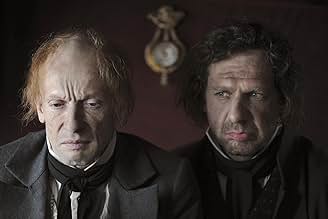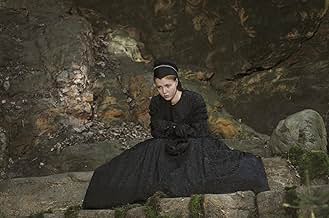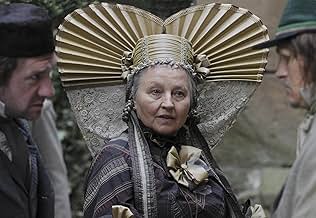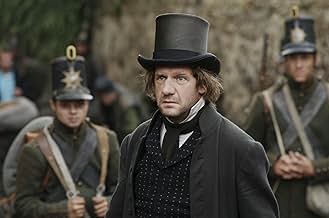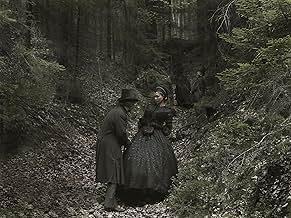CALIFICACIÓN DE IMDb
6.5/10
5.9 k
TU CALIFICACIÓN
Un erudito desesperado vende su alma a Satanás a cambio de una noche con una hermosa joven.Un erudito desesperado vende su alma a Satanás a cambio de una noche con una hermosa joven.Un erudito desesperado vende su alma a Satanás a cambio de una noche con una hermosa joven.
- Dirección
- Guionistas
- Elenco
- Premios
- 15 premios ganados y 27 nominaciones en total
Eva-Maria Kurz
- Faust's Cook
- (as Eva Kurz)
Opiniones destacadas
Compared to an aesthetic depiction of something like The Portrait of Dorian Gray, by Oscar Wilde, also a story of corruption, this ugly, often grotestque film, loosely based on Goethe´s Faust, is disappointing. It was a slog to get through because it was so drab and disgusting. Dust and darkness everywhere. Gross, deformed characters. Filth, misery, poverty, disease. Rats. Altogether quite unpleasant to watch. Still, I have to say that the director succeeds in creating a film as depressing as its subject: the corruption of a human being and the selling of his soul.
It begins with the evisceration of a corpse, and that could be a metaphor for the way this alleged adaptation proceeds - except that Goethe's "Faust" is not dead, only given the dead-letter treatment here. The film's emphasis is on gross, clumsy physicality: you never saw so many actors stumble as they walk, bumping into things and one another; too artless and unfunny for slapstick, the universal jostling is prevented from being laughable by funereal pacing and the array of hangdog faces. Since the Faust figure (Johannes Zeiler) conveys very little in the way of intellect, all that elevates him is that most of the other characters have been made open-mouthed gapers, presumable halfwits. Wit is barred out anyway by the color-palette, all various hues of mud - the surest sign of high-serious intentions in movies nowadays. In exterior shots the sky is overexposed so it shows as a gleamless white blur; the earth is dun-colored, greens are gray-tinged, and reds are virtually absent, on their rare appearance tending to brown, like bloodstained linens oxidizing. The cut of the men's clothing updates the story to several decades after Goethe's time: trousers are worn, rather than breeches and hose. The fabrics are thick, heavy, coarse, and of course dark-dyed and fraying badly. No one could think of playing the dandy here. Strangely, there seems to be no Republic of Letters either. The few characters with intellectual interests neither write nor receive letters; they're isolated from enlightenment and worldly affairs: no one awaits the postman; no one looks at a journal of science or politics or the arts - this is a stupefying omission, as false to the historical period as it would be to Goethe's own. Sokurov's flight from historical particulars strands his Faust: the fable and the character become "timeless" in all the wrong ways. Faust doesn't represent his age's high hopes, or its seeds of self-destruction; but then he doesn't represent our age either. Sealed off in its remoteness, Sokurov's "Faust" is just another - all-too-familiar - sulking, glooming art-house reverie.
a question more than a film. nothing surprising for Sokurov.because not the story is the axis but the atmosphere the air who seems be mud, the dialogues who are cold and bitter, the actors who becomes shadows. a film who propose the world in precise slices. and that is the source of controversies and the heart of a fascinating film about reality and choices. far to be comfortable, it is a challenge. because it propose the aesthetic of ugly things, because firs scene is an open corpse and the pact with devil has different nuances by the classic text of Goethe. but the idea is the same.same, the need of certitude. a film about the taste of knowledge. and the essence of self definition.
Best watched late on a sleepless night when you feel at the end of your tether. Like a nightmare that I couldn't wake from, this and a glass of scotch took the edge off my own bewildered existence. It needs several viewings to begin to get to the bottom of whatever it is trying to say about fallen man, but I am sure it is not a message of hope. As a piece of filmmaking I found it hard to fault. It transported me to an unknown, lost world that suggested Dark Ages Germany seen through an alchemist's green bottle spun faster and faster on some infernal machine. I am unlikely to forget this world even if I may be reluctant, for now, to revisit it. On another dark night perhaps.
Aleksandr Sokurov's take at Faust is a courageous act. Yet, my issues with this movie have nothing to do with the discussion whether a Russian director might understand the essence of Goethe's work. This is a futile debate, because Sokurov comes closer to Goethe than an average Westerner to Russian classics, as displayed in Joe Wright's Anna Karenina (2011).
In Faust, Sokurov did what he's done before. There are rather realistic, almost documentary images and there are dream-like sequences. We've seen the former in, for example, the trilogy of Moloch (1999), Taurus (2001) and The Sun (2005). And we've seen the latter in, for example, Russian Ark (2002) and Alexandra (2007). So what went wrong?
Again, i'm expressing my views here and won't try to judge Sokurov's talents and abilities. In Faust we kick off with the daily work of Dr. Faust and progress toward the space beyond reality. Whether it is a higher plane of existence or main character's hallucination is left unclear, yet it portrays well his inner state, triggered by malnutrition and selling the soul. Personally, at a certain point i found this movie difficult to watch...
In Faust, Sokurov did what he's done before. There are rather realistic, almost documentary images and there are dream-like sequences. We've seen the former in, for example, the trilogy of Moloch (1999), Taurus (2001) and The Sun (2005). And we've seen the latter in, for example, Russian Ark (2002) and Alexandra (2007). So what went wrong?
Again, i'm expressing my views here and won't try to judge Sokurov's talents and abilities. In Faust we kick off with the daily work of Dr. Faust and progress toward the space beyond reality. Whether it is a higher plane of existence or main character's hallucination is left unclear, yet it portrays well his inner state, triggered by malnutrition and selling the soul. Personally, at a certain point i found this movie difficult to watch...
¿Sabías que…?
- TriviaIt won the Golden Lion award at the 2011 Venice Film Festival. It is the 3rd Russian film to be crowned best film in Venice, after Ivan's Childhood (1962) and The Return (2003).
- ConexionesFeatured in At the Movies: Venice Film Festival 2011 (2011)
- Bandas sonorasSalve Regina
(uncredited)
Gregorian chant
Selecciones populares
Inicia sesión para calificar y agrega a la lista de videos para obtener recomendaciones personalizadas
- How long is Faust?Con tecnología de Alexa
Detalles
- Fecha de lanzamiento
- País de origen
- Sitios oficiales
- Idioma
- También se conoce como
- Faust
- Locaciones de filmación
- Productoras
- Ver más créditos de la compañía en IMDbPro
Taquilla
- Presupuesto
- EUR 8,000,000 (estimado)
- Total en EE. UU. y Canadá
- USD 58,132
- Fin de semana de estreno en EE. UU. y Canadá
- USD 10,030
- 17 nov 2013
- Total a nivel mundial
- USD 64,556
- Tiempo de ejecución
- 2h 20min(140 min)
- Mezcla de sonido
- Relación de aspecto
- 1.37 : 1
Contribuir a esta página
Sugiere una edición o agrega el contenido que falta


